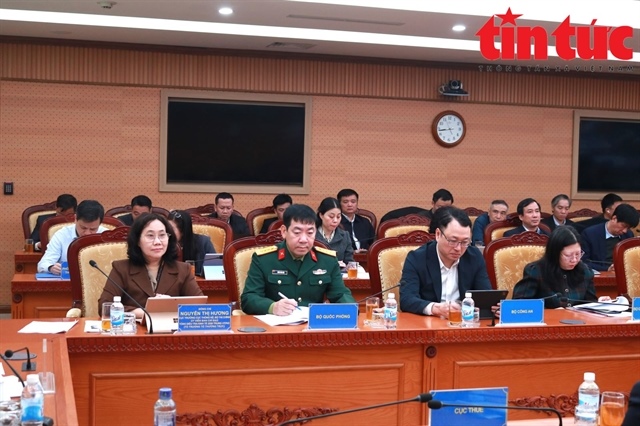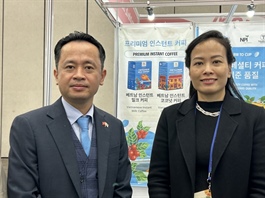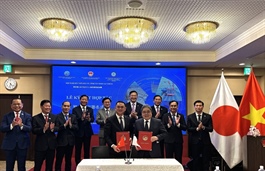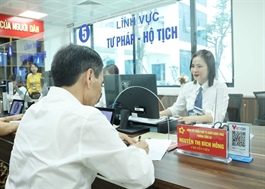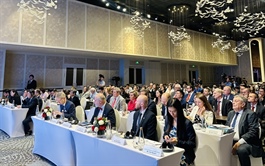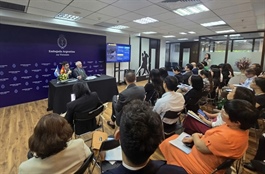SOEs urged to lead in innovation and digital transformation to maintain pivotal economic role
SOEs urged to lead in innovation and digital transformation to maintain pivotal economic role
In the current context of rapid technological advancement, strong private-sector development and deeper international integration, SOEs are expected to lead innovation, digital transformation and economic recovery. She stressed the need for stronger links between SOEs, collective economic organisations and private enterprises to boost development momentum.
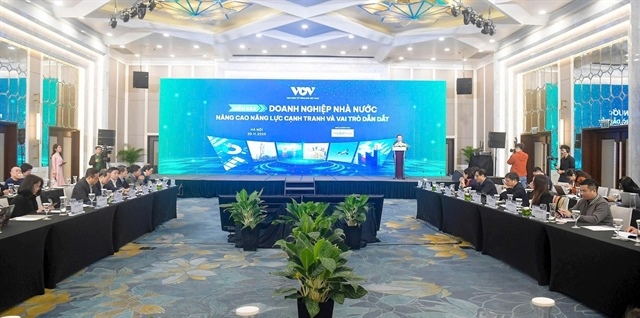
Hosted by the Voice of Vietnam, the forum attracted the participation of 250 delegates. — Photo hanoimoi.vn |
State-owned enterprises (SOEs) must take the lead in innovation, digital transformation and market-oriented restructuring to maintain their pivotal role in the national economy, senior officials and experts told a conference in Hà Nội on Thursday.
Nguyễn Thu Thủy, deputy director of the Ministry of Finance's State Enterprise Development Department, said SOEs not only drive economic growth but also play a central role in promoting social progress and equity, operating in key, essential and strategic sectors.
Thủy said that Resolution No 12-NQ/TW, issued by the Party Central Committee in 2017, provides clear guidance on enhancing the efficiency of SOEs. The resolution reaffirms their strategic role and sets out goals for restructuring based on modern technology, innovation capacity and international standards of corporate governance.
The objective, she said, is to mobilise and allocate social resources effectively, preserve and grow State capital and ensure that SOEs continue to serve as a key pillar of the economy.
In the current context, marked by rapid technological advancement, strong private-sector development and deeper international integration, SOEs are expected to spearhead innovation, digital transformation and economic recovery. She stressed the need for stronger linkages between SOEs, collective economic organisations and private enterprises to create broader development momentum.
Việt Nam is now home to 866 SOEs, with 49 ministries, sectors and localities acting as State capital representatives. By the end of 2024, these enterprises, excluding four State-owned commercial banks, managed more than VNĐ4.3 quadrillion in total assets, held over VNĐ1.9 quadrillion in equity and contributed over VNĐ400 trillion to the State budget each year.
Although SOEs’ total assets and equity remain lower than those of the non-State sector, accounting for only 22.6 per cent of total assets and 15.2 per cent of total capital of all enterprises in the 2017-23 period, the sector still contributed an average 34.2 per cent of total State budget revenue. Experts said this underscores the continued pivotal role of SOEs in the national economy.
However, they noted that despite their contributions, SOEs continue to face significant weaknesses and challenges.
Only a small number of major corporations are engaged in industries critical to national competitiveness such as core technology, digital technology and new and renewable energy, while most SOEs in essential sectors still operate in closed, self-contained production chains that leave little room for private-sector participation.
They also highlighted that SOE capital and asset resources remain underutilised due to restrictive regulations on investment authority, which limit enterprise autonomy in making major or high-risk investment decisions. Meanwhile, State reinvestment in SOEs is constrained and often delayed by narrow capital channels and cumbersome procedures, leaving many enterprises unable to implement new projects or keep pace with regional and international competitors.
SOEs’ production and business competitiveness remains low, with complex internal approval processes causing missed investment opportunities. Many enterprises must await clearance from ownership-representative agencies, slowing project progress and hindering business performance.
At the same time, investment activities across SOEs also lack coordination and strategic linkage, resulting in fragmented efforts and limited participation in global value chains. Although large SOE groups have pursued new projects, efficiency often falls short of expectations, with some enterprises experiencing prolonged losses and slipping into financial instability.
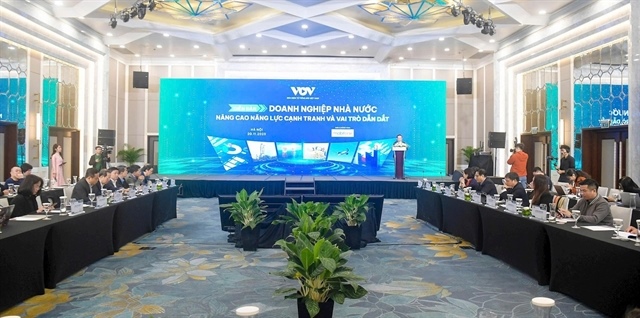
Hosted by the Voice of Vietnam, the forum attracted the participation of 250 delegates. — Photo hanoimoi.vn |
Nguyễn Tất Thái, deputy director general of the Forecasting and Statistics-Monetary and Financial Stabilisation Department under the State Bank of Vietnam, proposed that competent authorities soon issue documents specifying the Law on Management and Investment of State Capital in Enterprises to truly give more autonomy to enterprises and representatives of State capital in enterprises and specify the rights, responsibilities as well as standards and policies for representatives of State capital according to that law.
This move aims to ensure attracting talent, encouraging creativity but also serving as a basis for inspection, supervision and evaluation of efficiency, Thái said.
Thái also emphasised the importance of accelerating the restructuring and reform of SOE management, synchronously implementing model innovation with solutions to innovate management and supervision mechanisms and corporate governance according to market economy standards and international practices.
He added that policies must be clearly defined regarding the management of State capital invested in SOEs, the State’s oversight of all types of enterprises in the economy and the separation of functions between State capital ownership and enterprise governance.
According to Thái, competent authorities are currently researching, developing and promulgating resolutions, plans and strategies for State economic development. This will be an important legal basis demonstrating the determination and efforts to overcome difficulties to promote the leading role of SOEs in the new era.
However, it is necessary to pay attention to the synchronisation of goals and solutions between fields, sectors as well as executive documents, ensuring harmony but with separation between policy goals and business goals suitable for each sector and field, he noted.
For his part, economist Ngô Trí Long emphasised the need to overhaul the salary and bonus mechanisms for SOE leaders, arguing that compensation must be aligned with market principles.
Salaries should reflect performance, rewards should be based on the value created and penalties should correspond to the risks or losses caused, he said.
According to Long, salary and bonus policies must function as management tools rather than welfare benefits. If implemented seriously, transparently and consistently, such reforms would serve as a key to unlocking motivation, enhancing efficiency and strengthening public trust in SOEs in the new era.
- 16:29 20/11/2025



